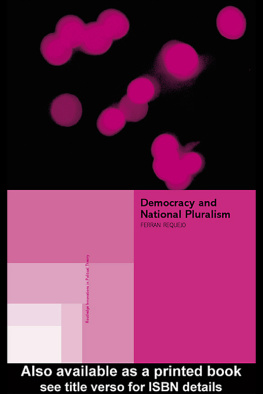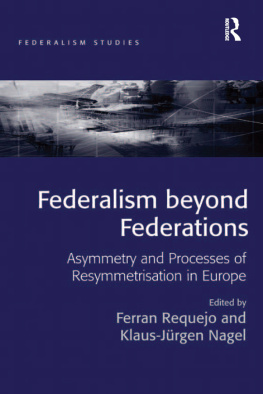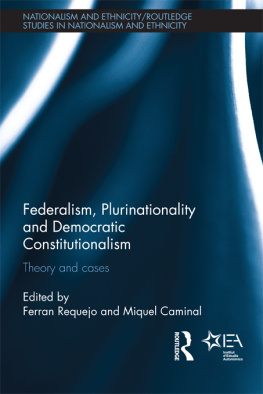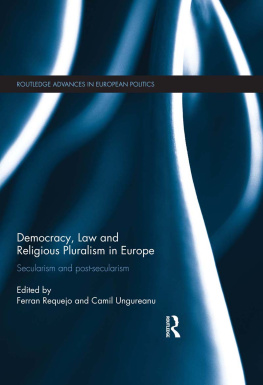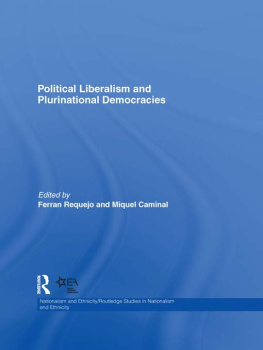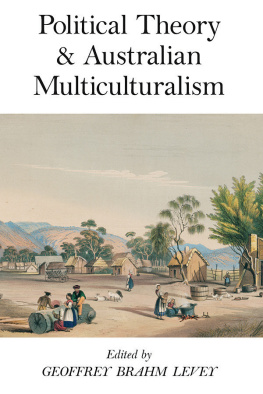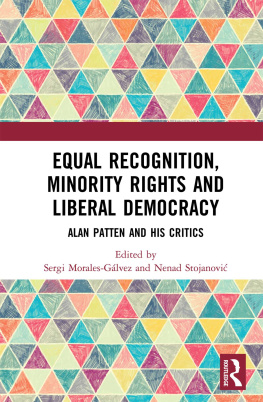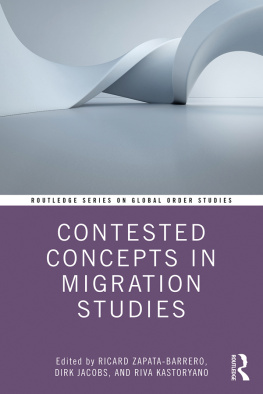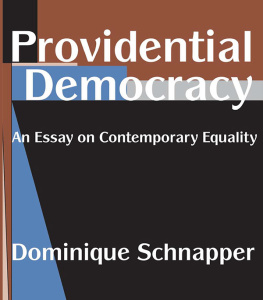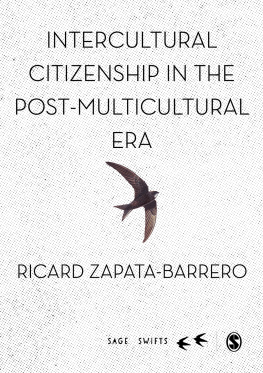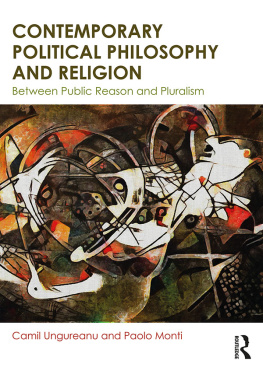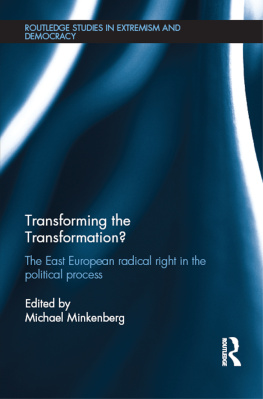Democracy and National Pluralism
For moral and practical reasons, in recent years there has been a growing interest in issues related to the recognition of different national groups within the same democracy. Belgium, Canada, Spain and the UK are examples of plurinational democracies which are currently reviewing the way in which their minority nations, such as the Flemish, Quebecois, Catalans and the Scottish are and should be treated in liberal and democratic terms.
Renowned international researchers in this book address the major questions of the conceptual and practical revision of plurinational liberal democracies at the beginning of the twenty-first century: political equality and citizenship; the cultural neutrality of the state; nationalism in the era of globalisation; the collective dimension of individual rights; and the institutional accommodation of different national collectivities in the public sphere of democratic politics, and of recent supra-state structures such as the European Union.
Democracy and National Pluralism will be a much needed resource for researchers in politics, international relations, political philosophy and public policy who are examining the contemporary challenges facing democracies and their relationship with the diverse national groups that coexist in their territories.
Ferran Requejo is Professor of Political Science at Pompeu Fabra University, Barcelona. In 1997 he was awarded the Rudolf Wildenmann Prize (ECPR). He is the co-editor of European Citizenship, Multi-culturalism and the State.
Routledge Innovations in Political Theory
1 A Radical Green Political Theory
Alan Carter
2 Rational Woman
A Feminist Critique of Dualism
Raia Prokhovnik
3 Rethinking State Theory
Mark J. Smith
4 Gramsci and Contemporary Politics
Beyond Pessimism of the Intellect
Anne Showstack Sassoon
5 Post-Ecologist Politics
Social Theory and the Abdication of the Ecologist Paradigm
Ingolfur Blhdorn
6 Ecological Relations
Susan Board
7 The Political Theory of Global Citizenship
April Carter
8 Democracy and National Pluralism
Edited by Ferran Requejo
Democracy and National Pluralism
Edited by Ferran Requejo
First published 2001
by Routledge
11 New Fetter Lane, London EC4P 4EE
Simultaneously published in the USA and Canada
by Routledge
29 West 35th Street, New York, NY 10001
Routledge is an imprint of the Taylor & Francis Group
This edition published in the Taylor & Francis e-Library, 2005.
To purchase your own copy of this or any of Taylor &Francis or Routledges collection of thousands of eBooks please go to www.eBookstore.tandf.co.uk.
2001 Selection and editorial matter Ferran Requejo; individual chapters, the contributors
All rights reserved. No part of this book may be reprinted or reproduced or utilised in any form or by any electronic, mechanical, or other means, now known or hereafter invented, including photocopying and recording, or in any information storage or retrieval system, without permission in writing from the publishers.
British Library Cataloguing in Publication Data
A catalogue record for this book is available from the British Library
Library of Congress Cataloging in Publication Data
Democracy and national pluralism / edited by Ferran Requejo.
p. cm. (Routledge innovations in political theory; 8)
Includes bibliographical references and index.
ISBN 0415255775 (alk. paper)
1. Democracy. 2. Pluralism (Social sciences). 3. MinoritiesCivil rights. 4. MinoritiesPolitical activity. I. Requejo Coll, Ferran. II. Series.
JC423 .D439795 2001
323.1dc21 2001019455
ISBN 0-203-16685-X Master e-book ISBN
ISBN 0-203-26162-3 (Adobe eReader Format)
ISBN 015255775 (Print edition)
To all our PhD students
Contents
FERRAN REQUEJO
PART I
Minority rights and globalisation in multinational democracies
WILL KYMLICKA
MICHAEL KEATING
PART II
National pluralism and democratic institutions
ENRIC FOSSAS
WAYNE NORMAN
PART III
National pluralism and the European Union
CARLOS CLOSA
RICARD ZAPATA
PART IV
Pluralism, democracy and political theory
FERRAN REQUEJO
Contributors
Ferran Requejo is Professor of Political Science at Universitat Pompeu Fabra, Barcelona, Catalonia, Spain.
Will Kymlicka is Professor of Philosophy at Queens University, Kingston, Ontario, Canada.
Michael Keating is Professor of Political Science at the University of Aberdeen, Scotland, United Kingdom.
Enric Fossas is Associate Professor of Constitutional Law at Universitat Autonoma de Barcelona, Catalonia, Spain.
Wayne Norman holds the Chair in Business Ethics in the Centre for Applied Ethics at the University of British Columbia, Vancouver, Canada.
Carlos Closa is Associate Professor of Political Science at Universidad de Zaragoza, Spain.
Ricard Zapata is Associate Professor of Political Science at Universitat Pompeu Fabra, Barcelona, Catalonia, Spain.
Introduction
It is so very Late that we May Call it Early by and by
Ferran Requejo
In a nocturnal scene, on seeing dawns light entering the room where he is standing, one of the characters in Shakespeares Romeo and Juliet exclaims: It is so very late that we may call it early by and by.1 Something similar could be said of the current situation of liberal democracies. Their theoretical health and undeniable practical success over the past two centuries do not hide, however, some of the conceptual and institutional shortcomings they display when faced with the new dawn that some aspects of politics are experiencing at the beginning of the twenty-first century.
Democratic liberalism has established itself as the most desirable, from a theoretical perspective, and the most stable, from a practical perspective, of all contemporary political traditions. It has a diverse and plural history that has been written by thinkers of acknowledged intellectual prestige such as Locke, Madison, Jefferson, Kant, Toque-ville, Mill, Weber, Berlin and Rawls. Its values and legitimising principles have shown themselves to be more suitable for practical application than those of alternative political theories. Furthermore, democratic liberalism is a practical and constitutional tradition that has no rivals among present-day political systems. It has been so successful that issues such as the protection of rights and freedoms, the existence of competitive elections and of an effective form of political pluralism, the implementation of the principles of constitutionality and legality, the separation and the division of powers or the articulation of a market economy with a degree of public interventionism have become generally accepted meta-values in Western societies.
However, this intellectual and constitutional solidity and the absence of rival political systems does not mean that liberal democracies can consider themselves entirely just systems that have no drawbacks or features that work against emancipation; or that they are somewhere at the end of history. Nor does it mean that it is easy to find new normative and institutional solutions from its legitimising and organisational principles when it comes up against new political challenges. This is true, for example, when it is forced to deal with such phenomena as globalisation, cultural pluralism or new kinds of international relations. When faced with these phenomena, the language, the institutions and even the usual interpretation of fundamental liberal and democratic values liberty, equality, pluralism or dignity require a revision of the theory and, above all, a series of practical and constitutional reforms that will bring about a moral improvement and a better adaptation to the new economic, political, cultural and technological conditions that prevail at the beginning of the twenty-first century.

